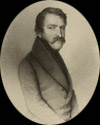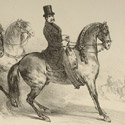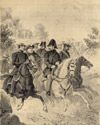19th Century´s militar history in the Basque Country
DON CARLOS. (1788-1855)
 Carlos María Isidro de Borbón, brother of King Ferdinand VII, was born in Madrid in 1788. He was the first Bourbon in line to the Spanish throne (Carlist). When, in 1830, Ferdinand VII abolished the Salic law to allow his new-born daughter Isabel to ascend to the throne, the Infante Carlos, heir to the throne up until this point, refused to accept the Pragmatic Sanction that placed his niece before him in the line of succession. He refused to face his brother directly, although he conspired against him during his exile in Portugal until the death of Ferdinand in 1833. The revolt of General Santos Ladrón in La Rioja and the proclamation of Carlos V as King in Bilbao and Vitoria led to the outbreak of the First Carlist War.
Carlos María Isidro de Borbón, brother of King Ferdinand VII, was born in Madrid in 1788. He was the first Bourbon in line to the Spanish throne (Carlist). When, in 1830, Ferdinand VII abolished the Salic law to allow his new-born daughter Isabel to ascend to the throne, the Infante Carlos, heir to the throne up until this point, refused to accept the Pragmatic Sanction that placed his niece before him in the line of succession. He refused to face his brother directly, although he conspired against him during his exile in Portugal until the death of Ferdinand in 1833. The revolt of General Santos Ladrón in La Rioja and the proclamation of Carlos V as King in Bilbao and Vitoria led to the outbreak of the First Carlist War.
Don Carlos, pursued by the Liberal General Rodil, was forced to flee to London from Portugal. Despite being watched, he managed to escape to France in July 1834 and reached Navarre, with the help of Basque smugglers, in order to meet up with the troops of Tomás Zumalacárregui, who he later appointed general-in-chief of his northern army. After an initial period that consisted simply of fleeing from his Liberal persecutors, particularly Rodil, he was able to set up a court, though this was moved as military advances were made. Oñate, Estella, Tolosa and Durango were some of its sites.
 The failure of the siege of Bilbao and the death of Zumalacárregui orced Don Carlos to change strategy. This led to the inauguration of his expeditions period, the aim of which was to spread the war around the Iberian Peninsula. They included the Gomez Expedition eof 1836, led by Don Carlos himself, and the Royal Expedition, which took the pretender and his troops to the gates of Madrid. The failure of this latter led to a stalemate period in the war that was marked by dissension among Carlist leaders.
The failure of the siege of Bilbao and the death of Zumalacárregui orced Don Carlos to change strategy. This led to the inauguration of his expeditions period, the aim of which was to spread the war around the Iberian Peninsula. They included the Gomez Expedition eof 1836, led by Don Carlos himself, and the Royal Expedition, which took the pretender and his troops to the gates of Madrid. The failure of this latter led to a stalemate period in the war that was marked by dissension among Carlist leaders.
Don Carlos punished those he considered responsible for the failure of the expedition, from the Infante Don Sebastián whom he relieved from command of the army, to Zaratiegui, Simon de la Torre, Villarreal, Elío and Eguía, who were either exiled or imprisoned.
 The Court of Don Carlos was dominated by apostólicos (the clerical party) who were in favour of continuing the war, while a large number of Basque Carlists wished to put an end to it. Don Carlos, after his betrayal by General Maroto was forced into exile in France after the Bergara Convention. The alliance between Espartero and Maroto put an end to seven years' war in Basque territory in exchange for respect for its Fueros (regional charters) and an end to the dynastic issue.
The Court of Don Carlos was dominated by apostólicos (the clerical party) who were in favour of continuing the war, while a large number of Basque Carlists wished to put an end to it. Don Carlos, after his betrayal by General Maroto was forced into exile in France after the Bergara Convention. The alliance between Espartero and Maroto put an end to seven years' war in Basque territory in exchange for respect for its Fueros (regional charters) and an end to the dynastic issue.
Don Carlos abdicated his rights to his son Carlos Luis, Count of Montemolín, who adopted the name Carlos VI.
After years of exile in Bourges with his second wife, the Princesa de Beira, he moved to Trieste where he died in 1855.

